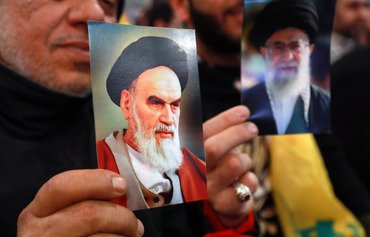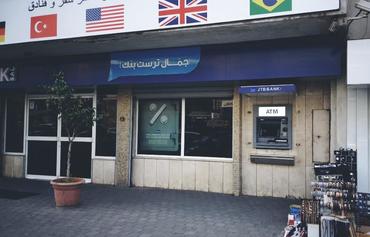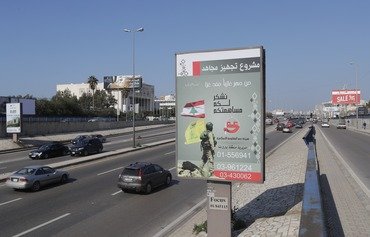As part of a continuing campaign to target Hizbullah's financial facilitators, the US Treasury on Wednesday (April 24th) designated two individuals and three entities acting as conduits for sanctions evasion schemes.
The two individuals sanctioned by the Treasury’s Office of Foreign Assets Control (OFAC) are Belgium-based Wael Bazzi and Lebanon-based Hassan Tabaja.
Bazzi was designated for acting for or on behalf of his father, Mohammad Bazzi, a Hizbullah financier. Tabaja was designated for acting for or on behalf of his brother and Hizbullah member and financier, Adham Tabaja.
The three blacklisted entities are Belgium-based Voltra Transcor Energy BVBA, Belgium-based OFFISCOOP NV, and UK-based BSQRD Ltd., for being owned or controlled by Wael Bazzi.
These individuals and entities were designated under Executive Order 13224, which targets terrorists and those providing support to terrorists or acts of terrorism, the Treasury said.
"Treasury is relentlessly pursuing Hizbullah’s financial facilitators by dismantling two of Hizbullah’s most important financial networks," said Sigal Mandelker, Treasury Under Secretary for Terrorism and Financial Intelligence.
"As Hizbullah continues to attempt to obscure its activities by using seemingly legitimate businesses, we will continue to take action against the front persons who hide the movement of money, including the relatives of designated terrorists," Mandelker said.
The move is part of a continuing effort "to disrupt all avenues of financial support relied upon by Hizbullah", she said.
It builds on the US State Department’s announcement of a $10 million reward for information leading to the disruption of Hizbullah’s financial mechanisms.
Money-laundering network blacklisted
Earlier this month, the Treasury blacklisted a Lebanese network accused of laundering millions of dollars for "drug kingpins" and helping to finance Hizbullah.
The Treasury on April 11th said it had added Lebanese national Kassem Chams to its blacklist, with two related entities: the "Chams Money Laundering Organisation" and Chams Exchange, a money service business in Lebanon.
The designation and imposition of US sanctions on the Chams Exchange is not surprising, according to a Lebanese military source who spoke with Al-Mashareq.
"Kassem Chams owns a large exchange company in Chtaura that has been operating on the Beirut-Bekaa-Syria line, trading in Syrian currency," said the source, who asked to remain anonymous out of concern for his safety.
Before the outbreak of the Syrian war, he said, the Chams Exchange company was the main outfit Syrians used to exchange Syrian currency for US dollars.
Most customers were Syrian expatriates who exchanged dollars for Syrian pounds before entering their country, he said, "while Syrian merchants bought dollars from him to conduct their transactions with the US dollar".
Chams "is an integral part of a financial apparatus that enabled him to accumulate a large amount of Syrian currency to trade with and sell to Syrian expatriates, as the exchange rate for the dollar in Syria had a preset ceiling, while he sold dollars at a price set by him", the source said.
Tracking Hizbullah's finances
The US Treasury "is continuing to track Hizbullah's funding sources to dry them up, and there will be zero leniency", said Lebanese security expert Naji Malaeb.
Tightening the financial screws on Hizbullah "will not stop", he told Al-Mashareq, noting that Hizbullah "is feeling the pressure".
The sanctions are "very serious", he said, noting the recent settlement decision involving Italian bank UniCredit, which will pay $1.3 billion to settle US government charges that it violated sanctions against Iran and other countries.
"It is expected that there will be more designations of individuals and companies close to the militia involved in drug trafficking and money laundering for the purpose of generating funds for the militia," Malaeb said.
The Central Bank of Lebanon (BDL) has been working in close co-operation with the US Treasury with regard to the sanctions imposed on Hizbullah’s funding channels, economist Violette Ghazal al-Balaa told Al-Mashareq.
This co-operation includes "open communication between the BDL and the US Treasury for consultation on cases of individuals and entities suspected of being involved in sanctioned financial activities", she said.
As an example of the way the two entities co-operate, she said, the US Treasury can submit a request to Lebanon to investigate irregularities in the activities of individuals or establishments suspected of involvement in funding Hizbullah.
The BDL then passes the request for investigation to its Special Investigation Commission (SIC), which lifts confidentiality on the accounts being investigated and informs the US Treasury of the results, al-Balaa said.
Curbing Iran's expansionist ambitions
The US sanctions "are part of escalating measures that are hardening day by day to dry up the sources of funding for Iran and its armed groups", said Naufal Daou, one of the founders of Lebanon's Assembly for Sovereignty.
The Assembly for Sovereignty is a grassroots movement founded in late 2018 that seeks to counter Hizbullah's influence in Lebanon.
"Hizbullah's role is no longer limited to executing Iran's security, military and economic policy," Daou told Al-Mashareq, as the militia also helps Iran obtain what it cannot obtain itself through pro-Hizbullah Lebanese nationals globally.
These include prominent businessmen and others who serve as a front for Hizbullah and facilitate its security, commercial and financial operations, he said.
"The US sanctions are a real and integrated war, whose aim is to exhaust Iran and its allies, including Hizbullah, and force Tehran to pull its military and security [forces] back inside its borders," Daou said.

![Hizbullah supporters gather near a giant poster of their leader Hassan Nasrallah during a ceremony to mark Ashura on September 20th, 2018 in Beirut. [Anwar Amro/AFP]](/cnmi_am/images/2019/04/26/17824-Lebanon-Nasrallah-Ashura-600_384.jpg)







Colonisation is now depending on your pens.
Reply1 Comment(s)